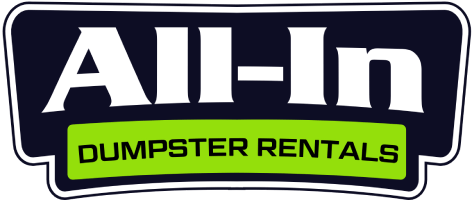The beautiful Blue Ridge Mountains that surround Asheville create a stunning backdrop for construction projects. But with that beauty comes responsibility—especially when it comes to properly disposing of construction debris. As a contractor working in Asheville and Western North Carolina, understanding the legal requirements for construction waste disposal isn’t just good practice—it’s essential for your business reputation and environmental stewardship.
Here in Buncombe County and the surrounding areas, we’ve seen firsthand how improper disposal can lead to significant fines, project delays, and damage to our region’s natural beauty. At All-In Dumpster Rentals, we work with local contractors daily who want to do the right thing but sometimes feel confused by the various regulations and requirements.
Construction debris management in Asheville presents unique challenges. Our mountain geography, environmental protections, and local regulations create a specific waste disposal landscape that contractors need to navigate carefully. Whether you’re renovating a historic home in Montford, building new condos in West Asheville, or tackling a commercial project downtown, knowing how to handle your construction waste legally is crucial.
What Qualifies as Construction Debris?
Before diving into disposal methods, it’s important to identify what actually constitutes construction debris. Construction and demolition (C&D) waste typically includes:
Wood materials (treated and untreated lumber, plywood, etc.) make up a significant portion of construction waste in our area, especially with Asheville’s mix of new construction and renovation projects. Concrete, brick, and block materials are common in foundation work and demolition throughout Buncombe County. Drywall, which contains gypsum, requires special handling due to potential environmental impacts when improperly disposed.
Metals (copper pipes, wiring, aluminum siding, steel beams) are valuable recyclables that should never end up in landfills. Roofing materials, particularly abundant during storm season in Western NC, include asphalt shingles, metal, and sometimes older materials like slate.
Glass from windows and fixtures, plastics from packaging and fixtures, and various insulation materials round out the common types of debris we see regularly at job sites across Asheville and surrounding communities.
Asheville’s Construction Waste Regulations
Working in construction in Western North Carolina means dealing with multiple layers of regulations. At the local level, Buncombe County Solid Waste Management has specific requirements for C&D waste. These rules cover what materials can go where, how they must be separated, and documentation requirements.
North Carolina state regulations also impact construction debris disposal. The NC Department of Environmental Quality (NCDEQ) maintains guidelines for proper waste management, with particular attention to hazardous materials that might be present in construction debris, especially from older buildings.
Federal EPA regulations create another layer of compliance, particularly regarding hazardous materials like asbestos and lead paint, which are common in Asheville’s older buildings and historic districts.
One point of confusion we often hear from contractors relates to the difference between regular municipal solid waste and construction debris. In our area, these waste streams are handled differently, with C&D waste often requiring special handling or disposal at specific facilities.
Penalties for Illegal Disposal in Western NC
The consequences of improper waste disposal in our region can be severe. Financial penalties start at the local level, where Buncombe County can issue citations ranging from hundreds to thousands of dollars depending on the severity and whether it’s a repeat offense.
State-level fines from NCDEQ can be substantial, sometimes reaching tens of thousands of dollars for serious violations. In extreme cases, contractors can face license suspension or revocation, effectively putting them out of business in North Carolina.
Beyond the immediate financial penalties, there are reputation costs in our tight-knit community. Asheville residents and businesses are particularly environmentally conscious, and word travels fast about contractors who cut corners on proper waste disposal.
Legal liability extends beyond fines—contractors can be held responsible for environmental cleanup costs, which can dwarf the original fines. We’ve seen local cases where cleanup costs reached six figures, particularly when waste affected waterways or protected areas.
Legal Disposal Options in Asheville and Surrounding Areas
For most contractors in our area, roll-off dumpster rentals are the most practical solution for construction debris. Companies like ours offer various sizes specifically designed for construction projects. In Asheville’s sometimes tight building sites, having the right size dumpster is crucial—too small and you pay for extra pickups, too large and you’re paying for unused space or facing challenges with placement.
The Buncombe County Landfill accepts certain types of construction debris, though contractors should be aware of specific restrictions and documentation requirements. For specialized materials, the Transfer Station on Hominy Creek Road provides another option, particularly for sorted recyclable materials.
Several recycling facilities in the Asheville area accept specific construction materials. For example, metal recyclers in the River Arts District area pay for scrap metal from construction sites, creating an opportunity to offset some disposal costs.
For hazardous materials commonly found in older Asheville homes (like asbestos, lead paint, or certain chemicals), specialized disposal services are necessary. These materials cannot go in standard dumpsters and require certified removal and disposal.
Material Separation and Recycling Requirements
Buncombe County and surrounding areas increasingly emphasize recycling construction materials when possible. Wood waste, particularly clean untreated lumber, has multiple recycling pathways in our area. Clean wood can be ground into mulch or used for biomass fuel.
Metal recycling makes both environmental and financial sense. The metal recycling infrastructure in Western NC is robust, with several facilities paying competitive rates for everything from copper wiring to steel beams.
Concrete recycling has expanded in recent years around Asheville. Crushed concrete can be used as aggregate for new projects, reducing the need for virgin materials and keeping heavy debris out of landfills.
Proper separation at the job site is the key to effective recycling. This might mean having multiple containers for different materials or scheduling separate pickups for recyclable materials. Though this requires more planning, the benefits include reduced disposal costs and enhanced environmental credentials, which many Asheville clients specifically look for.
Documentation and Reporting Requirements
For contractors working in Asheville and Western NC, proper documentation is crucial. Waste manifests and tracking records provide proof of proper disposal. These should be maintained for all significant disposal activities, especially for potentially hazardous materials.
Many local projects, particularly commercial ones or those seeking environmental certifications, require waste diversion reporting. This documents how much material was recycled versus sent to landfills.
Local municipalities may require permits for certain disposal activities, especially for larger projects within city limits. These permits often require documentation of your waste management plan.
For liability protection, contractors should maintain records of all disposal activities, including receipts from landfills or recycling facilities, dumpster rental agreements, and any special handling certifications for hazardous materials.
Special Considerations for Historic Properties
Asheville’s rich architectural heritage means contractors often work on historic properties. These projects present unique waste management challenges. Older buildings may contain materials no longer in use, some of which require special handling.
Asbestos was commonly used in many buildings constructed before the 1980s. In Asheville’s historic districts like Montford, Grove Park, and parts of downtown, asbestos may be present in insulation, flooring, roofing, and other materials.
Lead paint is another concern in buildings constructed before 1978. Renovation work that disturbs lead paint requires specific containment and disposal protocols under both state and federal regulations.
Historic properties may also contain valuable architectural salvage materials. Rather than treating these as waste, many Asheville contractors work with architectural salvage businesses to preserve and repurpose these materials, which aligns with both historic preservation values and waste reduction goals.
Best Practices for Contractors
Successful contractors in Asheville typically include waste management planning right from the project estimation phase. This allows for more accurate bidding and prevents unexpected disposal costs.
Training your crew on proper waste separation and handling not only ensures compliance but can reduce disposal costs through more effective recycling. Make sure workers know which materials go where and why proper separation matters.
Establishing relationships with reliable waste management partners is essential. Working with a local company like ours means you get advice specific to Asheville’s requirements and access to disposal options that meet local regulations.
Consider including your waste management practices in your marketing materials. Many Asheville clients specifically seek contractors with strong environmental credentials, and proper waste management is a visible demonstration of your commitment to responsible practices.
Emergency and Unforeseen Situation Handling
Western North Carolina’s sometimes unpredictable weather can create emergency situations. During storm cleanup, normal waste procedures may be temporarily modified. Stay informed about any emergency waste management provisions through local contractor associations or direct communication with waste management authorities.
If you discover hazardous materials unexpectedly during a project (like asbestos in an area not previously identified), stop work in that area immediately and consult with a certified hazardous material specialist. Continuing work could create liability issues and health risks.
For accidental spills or improper disposal situations, prompt reporting to appropriate authorities is always better than attempting to cover up the issue. Being forthright about accidents demonstrates good faith and may mitigate penalties.
Resources for Asheville Contractors
The Asheville Home Builders Association provides members with updates on waste management regulations and best practices specific to our region. Their workshops and networking events offer valuable information exchange among local professionals.
Buncombe County Solid Waste Management offers guidance documents and sometimes holds informational sessions for contractors on proper waste handling procedures.
The NC Department of Environmental Quality website contains comprehensive information on state requirements, while the Asheville city website provides local regulation details.
For contractors looking to go beyond basic compliance, organizations like the Western North Carolina Green Building Council offer resources on advanced waste reduction strategies and can connect you with others practicing sustainable construction in our region.
Looking Forward: Evolving Waste Management Practices
Asheville’s construction waste management landscape continues to evolve. Recent trends include increased emphasis on deconstruction rather than demolition, especially in our historic neighborhoods where materials can be carefully removed for reuse rather than demolished into mixed debris.
New recycling technologies are making it possible to recover more materials from construction waste. Staying informed about these developments can give forward-thinking contractors a competitive edge in our environmentally conscious market.
Asheville and Buncombe County have been discussing potential future regulations that may further restrict certain disposal practices or require higher recycling rates. Being proactive about adopting sustainable practices now can prevent scrambling to comply with new rules later.
The path forward for construction waste in our region clearly points toward more recycling, more careful material separation, and more emphasis on waste reduction at the source. Contractors who embrace these practices now will be better positioned for success in Asheville’s unique construction market.
By understanding and following proper disposal methods for construction debris, contractors not only avoid penalties but also contribute to preserving the natural beauty that makes Western North Carolina such a special place to live and work. At All-In Dumpster Rentals, we’re committed to helping local contractors manage their waste responsibly and efficiently, keeping our community clean and our mountains beautiful for generations to come.

